With summer heating up, Intermountain Health dietitians have an important reminder to stay hydrated.
With summer heating up, Intermountain Health dietitians are encouraging people to stay hydrated with fluids – and foods.
“All beverages — especially water — fruits, vegetables, and even brothy soups can help the body stay hydrated,” said Chelsie Woodmansee, a registered dietitian nutritionist with Intermountain Health. “The goal is to have 20 percent of your hydration come from water found in foods, and 80 percent from beverages.”
Fruits and vegetables with high water content include melons, like honeydew and watermelon, grapes, pineapple, apples, pears, berries, celery, cucumbers, cooked squash, and spinach. Foods such as these should be eaten every day during the summer, especially if a person plans to be active outside in the heat.
Water accounts for about 70 percent of a body’s composition and helps to keep all of our body’s systems working well. It also helps regulate body temperature, control blood pressure, lubricate joints, transport nutrients in the body, and helps to improve athletic performance.
Water can be lost through sweating, making urine, having a bowel movement but also by breathing during heavy physical activity, or illness with fever, diarrhea, or vomiting. People need more fluids to stay hydrated in hot weather, and at high altitudes, but also if their diet is high in sodium, whatever the season.
People who are not well hydrated may experience:
- Thirst
- Headaches
- Increased body temperature
- Fast breathing and pulse
- Dizziness
- Confusion
- Fatigue
- Reduced urination
- Digestion issues
Woodmansee gives these tips to stay hydrated:
- Drink water or unsweetened beverages all day every day and include at least a fruit or vegetable at each meal to stay ahead of dehydration.
- Use a clear bottle to see how much your drinking, keep frozen water bottles on hand so you always have something cold, flavor water with fruit, lemons, or limes.
- At baseline, women should drink about 11.5 cups per day and men should drink about 15.5 cups per day according to the Academy of Nutrition and Dietetics.
- Increase or decrease this to obtain a urine color that is a pale-yellow color. Think of pale lemonade.
- If it is a dark yellow or amber color, you may need to drink more.
- If it’s completely clear, you may need to back off slightly on drinking fluids because overhydration can also be unsafe.
- If you find yourself to be a heavy sweater- and some ways to tell are if you have white markings on clothing after sweater, you notice your sweat is very salty like when you lick your lips and tastes like salt, or if you experience cramping with sweating and activity, then replace those lost electrolytes with sports drinks, electrolyte drink mixes, or salty foods with water, such as pretzels, crackers or pickles.
More information on healthy food choices and activities can be found at intermountainhealth.org.
About Intermountain Health
Headquartered in Utah with locations in seven states and additional operations across the western U.S., www.intermountainhealth.org is a nonprofit system of 33 hospitals, 385 clinics, medical groups with some 3,900 employed physicians and advanced care providers, a health plans division called SelectHealth with more than one million members, and other health services. Helping people live the healthiest lives possible, Intermountain is committed to improving community health and is widely recognized as a leader in transforming healthcare by using evidence-based best practices to consistently deliver high-quality outcomes at sustainable costs. For more information or updates, see https://intermountainhealthcare.org/news.
